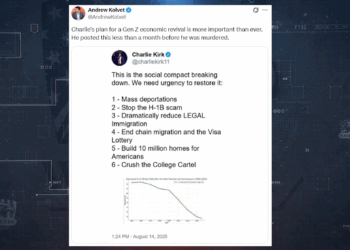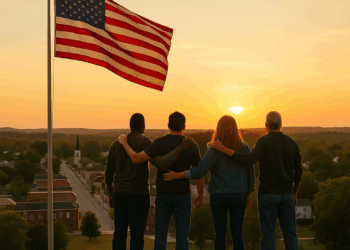In a charged monologue after a press conference outside the U.S. Department of Agriculture — a department founded by President Abraham Lincoln in 1862 to safeguard America’s food supply — Steve Bannon underscored President Trump’s renewed focus on both food security and border integrity. With President Trump back in the White House, Bannon framed the current moment as one of existential urgency, drawing connections between domestic policy, national security, and the global threats posed by the Chinese Communist Party (CCP).
Bannon highlighted Brooke Rollins, now Secretary of Agriculture, as central to this mission. Rollins, joined by key figures such as Peter Navarro, Kristi Noem, and Pete Hegseth, is leading efforts to block foreign influence in U.S. agriculture—specifically targeting the CCP’s infiltration through land purchases, food processing, and bioterror vulnerabilities. A new initiative, announced with Senator Marco Rubio, will launch federal countermeasures to secure America’s food system. Bannon predicted executive orders would soon follow and confirmed an emergency cabinet meeting with President Trump scheduled for 11:00 a.m.
The second half of Bannon’s message zeroed in on immigration and labor. He passionately reaffirmed the administration’s stance: "No amnesty, no way.” According to Bannon and Rollins, mass deportations will proceed—but with strategic planning to protect food supply chains and allow automation and workforce transition. Rollins noted the existence of 34 million able-bodied adults currently on Medicaid—potential candidates for workforce integration under a renewed American-first labor strategy. The goal: a 100% American workforce.
Bannon also addressed widespread concern among conservative grassroots that the administration might secretly reintroduce amnesty through executive orders related to H-2A or H-1B visa programs. He clarified that while some discussions had occurred, Rollins had been adamant: no such provisions are in play. Bannon emphasized that any reform or reprioritization of visa programs would be aimed at eliminating corporate abuse and further insulating America from dependency on foreign labor.
He then pivoted to a fiery critique of the broader geopolitical landscape. Referring to President Trump’s recent dinner with Israeli Prime Minister Benjamin Netanyahu, Bannon accused Netanyahu of turning Israel into a hyper-religious state, comparing it controversially to Pakistan. He mocked Netanyahu’s delayed recognition with a "Nobel Peace Prize” and sarcastically referenced the Pakistani military chief’s prior acclaim.
Throughout the remarks, Bannon reiterated that this is not a time for despair or hesitation. He invoked the spirit of "Fight Club,” calling on supporters to reject defeatism and engage the battle head-on. "We don’t suck our thumbs,” Bannon said. "We fight.”
Framing the moment as a pivotal confrontation between American populism and entrenched globalist forces—from hedge funds to foreign governments—Bannon’s message was clear: The Trump administration’s second term will be unapologetically combative. The stakes, in his view, are nothing less than sovereignty, security, and survival. And with Trump as both President and movement leader, Bannon sees the path ahead not as a return to politics-as-usual, but as a transformative campaign to redefine American self-rule.
For more, watch this Tuesday WarRoom segment:





